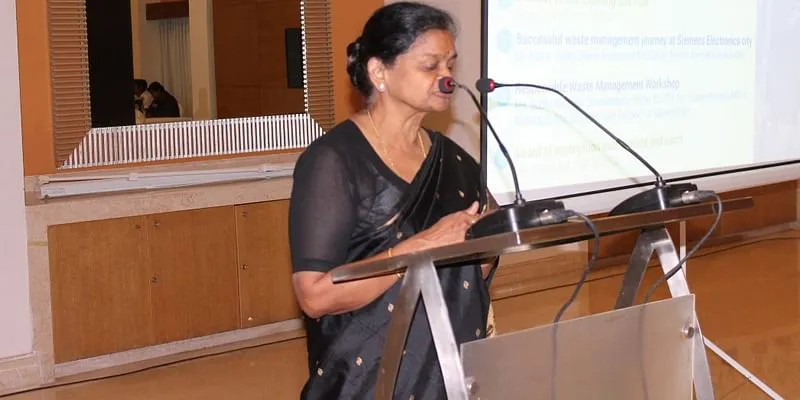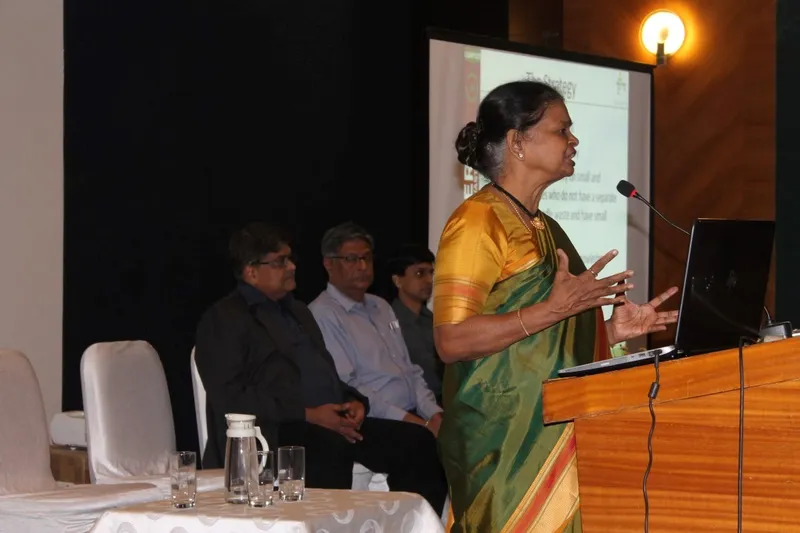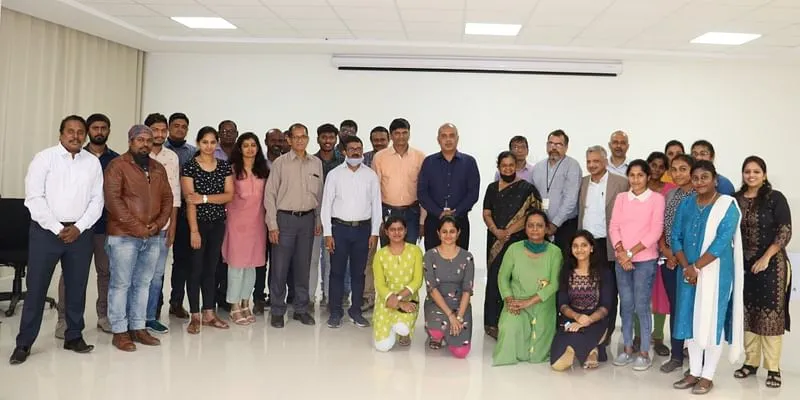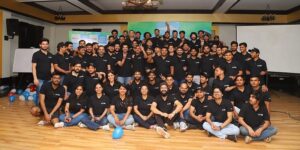Fifty years ago, Rama NS became one of the first women in Karnataka to graduate from an engineering college.
In the last five decades, the adviser of Electronics City Industrial Township Area (ELCITA), a first-of-its-kind self-governed municipality in India, tread several paths, battled many stereotypes, took on challenges head-on in diverse fields to become the formidable leader she is today.
In a conversation with YourStory, Rama traces the different aspects of her career — her engineering college experiences, her path-breaking work with NEC and Infosys, or her initiatives against sexual harassment — not with pride, but with a lot of empathy and understanding of the times she lived in, and how they are changing.

To college in langa davani
When Rama scored a centum in her board exams, her sister convinced her to take up engineering. Her mother, however, was not convinced and went to meet one of her professors at the National Institute of Engineering, Mysuru, to request him to move her to Home Science.
“He would not have any of it and convinced my mother that I belonged in engineering and so, I became one of the two girls in my batch. Though, I was the only one to complete the course,” Rama recalls.
Being short in physique, she wore the “langa davani” (a half-saree) to college and remembers being teased mercilessly by the boys who asked if she was still in middle school. Then, she started wearing a saree and continues to wear one to this day.
After completing her electrical engineering course in 1970 with a gold medal, Rama joined Indian Telephone Industries.
“I was fortunate enough to get a job because those days it was difficult to land one. My mother also had a stipulation that she would allow only if it was in Bengaluru. So, I joined ITI,” she says.
From electrical engineering to telecom
At ITI, she gained intensive experience in telecom R&D and worked in areas of core switching, wireless and wire-line communications, networking, satellite communications, microwave, and radio equipment development.
“In 1971, I was among the first women to be sent to IIT-Kharagpur to learn about microwave systems. Those days, girls were not sent anywhere and I appreciate my immediate boss for this opportunity. This was my first trip outside Karnataka that my parents let me go on,” recalls Rama.
Since then, she has travelled all over India and the world and credits some “very progressive men around her” who believed in her capabilities for her success.
At ITI, she was responsible for bringing state-of-the-art digital M/W technology into the country in the 80s. She has managed telecom and non-telecom programmes with customers like HP, AT&T Philips, Siemens, NEC, NSW, OKI, Alcatel…in the US, Japan, and the UK.
In 1995, Rama moved to Infosys after seeing that things were not moving in ITI.
“Things were not moving at the pace I wanted it to happen. I had thoughts of leaving but I didn’t really have a job when I quit ITI. I saw an ad from Infosys asking for a person from a telecom background to train young engineers in domain knowledge. The interviewer, a young guy, asked how he could hire me as I was a very senior person. I told him I would like to work in a place where I can contribute. Those days, Infosys had only about 800 employees,” she says.
Around the time, the IT boom was just waiting to happen. Rama joined as a training-in-charge for the Nortel account. In between, she moved to Satyam but switched back to Infosys, taking care of development and software for tech majors like Nortel, Microsoft and Cisco.
The move to information technology

Fortunately for her, she had taken to software writing in ITI itself. So, the move to IT was not as difficult. She had to adapt in other ways though. She was 45 and her team was made up of boys and girls in their early 20s.
“I don’t know how they felt but I have always felt that being with young people makes you feel young,” she says with a laugh. She had no qualms in asking for information, and approaching young people to learn, and this, she says, made a huge difference in how she was perceived.
At Infosys, she became the delivery head for a large team of 4,500 people and location head for Bangalore DC with 22,000 people. She also started mentoring women and became involved in various community activities.
To combat peak hour traffic, Rama took it upon herself to implement INSTANT (Infosys-Stanford Traffic Project) which incentivises people who arrive prior to peak hours of the day.
This used online applications that collected arrival data from swiping machines and decided the winners based on an algorithm adhering to predetermined rules. It was successfully demonstrated with around 20 percent of the people choosing to come early hoping to win prizes.
She was also the Founder President of Infosys Women’s Inclusivity Network (IWIN) and during her tenure, arranged many inspirational interactions and technical seminars for women.
Helming Electronic City initiatives

Rama with her team
In 2009, Rama retired at the age of 60. At the time, she wanted to settle down to a normal life with her family. But that was not to be.
“My husband was unwell and I also had to take care of my new grandson. Though I wanted to do something, I was not looking at any target-driven place. ELCITA approached me since I was interested in elevated road construction during my tenure with Infosys. That’s how my work after retirement began,” she says.
“As CEO of ELCITA, my responsibility was to take Bengaluru’s Electronics City to the next level and improve the quality of life of the people living there,” explains Rama.
With a focus on sustainable development of the industrial estate, she supervised all municipal functions including security, road maintenance, waste management, and providing companies a common platform and facilities centre.
ELCITA now boasts of smart street lights, smart parking, smart traffic lights, e-toilets, smart waste management, smart water supply, smart complaint/issue management, smart fleet management, smart security.
The ELCIA cluster is one more feather on her cap. It is an SPV, which has built a Common Facility Centre for the benefit of MSMEs. The cluster was recognised under the MSME CDP Scheme of GoI and got funded to establish the Mechanical and Electronics manufacturing facility.
This facility is established to aid MSMEs to augment their products, conduct R& D activities, prototype, and test and build skilled manpower.
Currently, Rama serves as an adviser to ELCITA.
Believe in yourself
She believes though women have come a long way from when she first started 50 years ago, they still have to live up to expectations of handling both family and work efficiently.
“I think a lot of women doubt that they can do it. At every company I worked for, even while climbing on microwave antenna towers, I never felt I was a woman doing it nor did I ask for special privileges because I am one. I don’t think that I’m a woman doing a task and that makes a big difference,” she says.
She narrates an incident when she was sent to Kalimpong to fix a problem and the officer there called her boss and asked, “Kya, chokri ko bhej diya hai? Kya karti sakti hai yeh? (Why have you sent a girl? What can she do?).
“I was in my mid-20s and they were not sure I could do the job,” she recalls.
Rama believes one has to go beyond one’s comfort zones and keep learning on the job. She also says managing our ego is very important without compromising on self-respect. Also, networking is an essential tool to get ahead in one’s career and life.
“I have always felt networking for women is a challenge considering she has so much to do. I have gone through days where there were no emails to keep in touch either personally or professionally. Social media platforms are very useful in being connected to relevant groups, especially for women,” she says.
“It doesn’t matter, if as a woman, you are juggling different things. It’s important to create a support system around you. It may be difficult, but it’s not impossible,” she adds.
Rama kept herself busy during the pandemic teaching students Math and Kannada online. It’s these interactions with young people she cherishes the most.
She exemplifies that age is never a deterrent if you put your mind to something. It could be anything that makes you happy.
“After this, I may do something else. Knowing me, I can’t be quiet for long. But I would love for the younger generation to take over,” she quips.

![You are currently viewing [Techie Tuesday] Meet Rama NS, one of the first women engineers from Karnataka who put Electronic City on the](https://blog.digitalsevaa.com/wp-content/uploads/2021/04/Untitleddesign-2021-04-19T125609-1618817343011.png)







![Read more about the article [Funding roundup] FitBudd, Workruit, and others raise early-stage funds](https://blog.digitalsevaa.com/wp-content/uploads/2022/03/V-05-1600852077699-300x150.png)